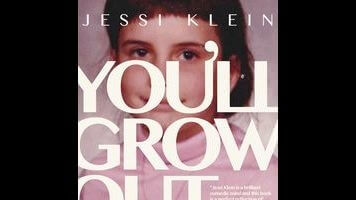An Inside Amy Schumer writer grows into womanhood in You’ll Grow Out Of It

In “Poodle Vs. Woolf,” an essay in Jessi Klein’s highly enjoyable and hilarious debut collection, You’ll Grow Out Of It, the comedian and writer divides women into two categories: women who exist effortlessly within their femininity (poodles) and those who don’t (wolves). Poodles laugh a lot; wolves eat a lot. Poodles are always late; wolves show up early to everything and “have to fake a conversation on their cell phones so they look like they know other human beings.” Angelina Jolie is a poodle, while Sandra Bullock is a wolf. Both are beautiful, successful women; one just tries a little harder than the other.
Although this division might seem reductive (reminiscent of Mad Men’s Jackie vs. Marilyn dichotomy), it illustrates the author’s frustration with traditional femininity and highlights one of the book’s main concerns: the impossibility of living up to such ideals, especially when it comes to women’s appearance, or what Klein calls the “bullshit you need to do to have the world look at you.” The pain and awkwardness that arise when the world isn’t looking at you is all the more painful and awkward for women, as they’re taught from the get-go that the male gaze gives them value. These ideas will probably feel familiar to fans of Inside Amy Schumer, for which Klein serves as executive producer and head writer.
As with Inside Amy Schumer, in this essay collection Klein does a particularly good job of describing how contradictory it can feel to live as a woman who recognizes the ridiculousness of traditional feminine ideals yet still wants to fulfill them (or, at least, some of them to some extent). She writes about loving the embarrassingly pleasurable store Anthropologie (a place where she feels “emotionally home… As if somewhere behind the rack of Eiffel Tower dish towels, I will find MY REAL DAD.”), her strange fascination with The Bachelor, and her preoccupation with getting engaged to her then boyfriend/current husband. In addition to being hilarious throughout, Klein imbues her writing with melancholic resignation. In “Tom Man” she describes transforming into “one of those standard grown-up ladies”—women who ditch shitty backpacks for purses and buy lingerie instead of cotton underwear five to a pack—as “shrinking rather than growing.” Are these ideas new? No, certainly not. But Klein enlivens them through her personal experience and humor, with self-deprecating observations and pointed insights.
The stand-up and sketch writer (she’s also written for Saturday Night Live) doesn’t always take full advantage of the page, however, with many of the essays adopting the rhythms of a Moth performance (she’s indeed performed a few of them for the live storytelling series). One can almost hear her voice dipping down at the end of shorter pieces, wrapping things up neatly to arrive at an easy-to-digest significance. While those tidy endings and shortcuts to meaning might be more forgivable in a live medium, here they make some pieces seem abrupt, ending just as they start to get somewhere really good.
Which is too bad, because Klein is fun, intelligent, fiercely observant, and hilarious; and the more time you spend with her (and the more time she spends with her ideas) the better. Unsurprisingly, the collection’s best essays are its longest ones. Klein accounts her ill-advised relationship with a narcissist in “The Cad” (TL;DR: Don’t trust a dude who wears loafers without socks); in “Dogshit” she describes wanting to transform into a “PRINZESS” for the 2015 Emmys (when Inside Amy Schumer won for Outstanding Variety Sketch Series) and how satisfaction doesn’t necessarily follow success. She especially hits it in “How I Became A Comedian,” chronicling her relatively slow path into comedy, first working in development at Comedy Central for several years before taking the plunge and performing stand-up at open mics throughout New York. When so many artists’ and celebrities’ origin stories feature prodigious youth who claim they’ve known their callings since birth (complete with grainy home videos of talent shows and musicals), it’s refreshing and inspiring to hear someone who has struggled trying to fulfill her aspirations. Realizing what you want to do with your life can be terrifying, because you have to stop looking and start doing.
“When I tell people I do stand-up, they often say to me, ‘You must be so brave,’ but that’s not really true,” Klein says in “How I Became A Comedian.” “What bravery exists is sort of a secondary symptom to an underlying problem: desperate, aching need.” So it goes with the essays in this collection. The most complete, revelatory pieces feel born from a need in the writer to tell them, not a need to fill a page count, but even the thinner pieces deliver hysterical lines. You’ll Grow Out Of It is like beginning a friendship with a very smart, funny, occasionally reserved woman: She might start out sharing stray observations about Victoria’s Secret, but once she gets to know you, she’ll reveal her deepest fears and firmest beliefs—and make you laugh along the way.